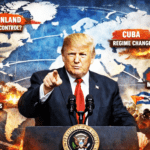American politics has always been a theater of intrigue, where power struggles and secrecy collide. From the assassination of President John F. Kennedy to the recent leaked text messages involving the Trump administration, the threads of history seem to intertwine, revealing a recurring pattern of information mishandling, public distrust, and political maneuvering.
But what if these events are more than just coincidences? What if they are deliberate acts designed to destabilize leadership and shift the balance of power? This analysis delves into the parallels between the JFK files and the Trump administration’s leaked messages, exploring the possibility of a calculated conspiracy to undermine Trump after an alleged assassination attempt failed.
The JFK Files: A Legacy of Secrecy and Speculation
The assassination of JFK in 1963 remains one of the most scrutinized events in American history. The release of classified files decades later has done little to quell the speculation surrounding his death. Instead, it has reignited debates about the role of intelligence agencies, the possibility of a broader conspiracy, and the consequences of withholding critical information from the public.
The files reveal intelligence failures, such as the inability to track Lee Harvey Oswald’s movements and the lack of coordination between agencies. These gaps have fueled theories that JFK’s assassination was not the act of a lone gunman but a coordinated effort involving multiple actors. Whether or not these theories hold water, the secrecy surrounding the files has eroded public trust in institutions meant to protect democracy.
This historical context sets the stage for understanding how information—whether withheld or leaked—can be weaponized to shape narratives and influence political outcomes.
The Trump Administration: A Modern-Day Parallel
Fast forward to today, and we find ourselves grappling with a similar dynamic. The leaked text messages from the Trump administration, detailing discussions about Houthi attack plans, have sparked controversy and raised questions about operational security. The use of an unsecured messaging platform like Signal to discuss sensitive military operations is, at best, a lapse in judgment and, at worst, a deliberate act of sabotage.
What makes this incident particularly striking is the context in which it occurred. Trump, a polarizing figure, has faced relentless scrutiny and opposition throughout his political career. The leaked messages not only compromise national security but also serve to undermine his administration’s credibility. Could this be a coincidence, or is it part of a larger effort to destabilize his leadership?
A Conspiracy in the Making?
To fully grasp the implications of these events, we must consider the possibility of a conspiracy. The JFK files have long been a breeding ground for theories about hidden agendas and covert operations. Similarly, the leaked messages involving Trump raise questions about intent. Was this an accidental breach, or was it orchestrated to weaken his administration?
The timing is worth noting. The leaks come after an alleged assassination attempt on Trump failed, leading some to speculate that his opponents have shifted tactics. If removing him physically was not an option, could they be targeting him politically instead? By exposing sensitive information and painting his administration as reckless, they could erode public confidence and pave the way for alternative leadership.
While these theories may seem far-fetched to some, history has shown us that power struggles often play out in the shadows. The parallels between JFK’s era and today are too significant to ignore.
The Role of Transparency and Secrecy
Both the JFK files and the Trump administration’s leaked messages highlight the delicate balance between transparency and secrecy. In JFK’s time, the lack of immediate access to information fueled decades of speculation and distrust. Today, the digital age allows for instantaneous leaks, amplifying their impact on public perception.
However, the response to these events has been strikingly similar. In both cases, officials have downplayed the significance of the information, opting for secrecy or denial rather than addressing the root issues. This approach only serves to deepen public skepticism and fuel conspiracy theories.
Transparency is essential for accountability, but it must be balanced with the need to protect national security. The mishandling of sensitive information—whether through leaks or withheld files—has consequences that extend far beyond the immediate moment. It erodes trust, weakens institutions, and leaves a lasting impact on governance.
The Human Element: Errors or Intentions?
At the heart of these events lies the human element. Intelligence failures, lapses in judgment, and deliberate actions all play a role in shaping the narrative. In JFK’s era, the inability to track Oswald and the lack of coordination between agencies were seen as errors. Today, the use of unsecured messaging platforms and the inclusion of a journalist in sensitive discussions raise questions about whether these were mistakes or intentional acts.
The human element also extends to the public’s response. In both cases, the dissemination of information—whether through leaks or declassification—has shaped public perception and influenced political discourse. The way these events are framed and interpreted can have a profound impact on leadership and governance.
Implications for Leadership and Governance
The parallels between JFK and Trump’s experiences underscore the challenges leaders face in navigating crises. For JFK, the aftermath of his assassination tested the resilience of American democracy. For Trump, the leaked messages challenge his administration’s credibility and ability to maintain control over sensitive matters.
Both cases highlight the importance of ethical communication, robust security protocols, and a commitment to transparency. Leaders must prioritize these principles to foster trust and ensure effective governance.
A Call for Vigilance
As we reflect on these events, the lessons are clear. The mishandling of sensitive information—whether through negligence or deliberate action—has far-reaching consequences. It erodes trust, fuels speculation, and weakens the very institutions it seeks to protect.
The parallels between the JFK files and the Trump administration’s leaked messages serve as a cautionary tale for current and future leaders. Transparency and accountability are not just ideals; they are necessities for effective governance. The stakes are too high for complacency.
Whether or not a conspiracy exists, the need for vigilance is undeniable. Leaders must prioritize ethical communication, robust security protocols, and a commitment to the truth. Only then can we build a future where trust in governance is restored, and the balance between transparency and secrecy is maintained.

















